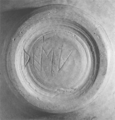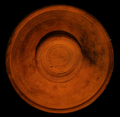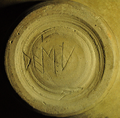TI·9: Difference between revisions
No edit summary |
No edit summary |
||
| (2 intermediate revisions by the same user not shown) | |||
| Line 29: | Line 29: | ||
}} | }} | ||
==Commentary== | ==Commentary== | ||
First published in {{bib|Herbig 1906}}: 189, no. 2. | First published in {{bib|Herbig 1906}}: 189, no. 2. Examined for LexLep on 16<sup>th</sup> October 2023. | ||
Images in {{bib|Herbig 1906}}: 189, no. 2 (drawing), {{bib|Rhŷs 1913}}: tav. IV (photo), {{bib|Crivelli 1973b}}: tav. 8.9 (drawing), {{bib|Solinas 1995}}: tav. LXIb (photo), {{bib|Motta 2000}}: 212, fig. 19 (photo), {{bib|Morandi 2004}}: tav. V.10 (photo), {{bib|Pernet et al. 2006}}: 233, fig. 6.39 = pl. sub 93.11 (drawing). | Images in {{bib|Herbig 1906}}: 189, no. 2 (drawing), {{bib|Rhŷs 1913}}: tav. IV (photo), {{bib|Crivelli 1973b}}: tav. 8.9 (drawing), {{bib|Solinas 1995}}: tav. LXIb (photo), {{bib|Motta 2000}}: 212, fig. 19 (photo), {{bib|Morandi 2004}}: tav. V.10 (photo), {{bib|Pernet et al. 2006}}: 233, fig. 6.39 = pl. sub 93.11 (drawing). | ||
Inscribed on the foot of the mortarium (length 3.5 cm). The letters are well legible and unambiguous. Herbig reads {{w||remu}}, as do {{bib|Rhŷs 1913}}: 29 f., no. 9; {{bib|Whatmough 1933}}: 76 f., no. 258; {{bib|Crivelli 1943}}: 53; {{bib|Pisani 1953}} = {{bib|Pisani 1964|1964}}: no. 120 F; {{bib|Lejeune 1971}}: 64. {{w||reśu}} is suggested by | Inscribed on the foot of the mortarium (length 3.5 cm). The letters are well legible and unambiguous. Herbig reads {{w||remu}}, as do {{bib|Rhŷs 1913}}: 29 f., no. 9; {{bib|Whatmough 1933}}: 76 f., no. 258; {{bib|Crivelli 1943}}: 53; {{bib|Pisani 1953}} = {{bib|Pisani 1964|1964}}: no. 120 F; {{bib|Lejeune 1971}}: 64. {{w||reśu}} is suggested by {{bib|Tibiletti Bruno 1968b}}: § 1 (n.v., also {{bib|Tibiletti Bruno 1976}}: 102, {{bib|Tibiletti Bruno 1978}}: 143 f.; {{bib|Tibiletti Bruno 1981}}: 157 f., no. 2), followed by {{bib|Solinas 1995}}: 323, no. 6; {{bib|Motta 2000}}: 212, no. 22; {{bib|Morandi 2004}}; {{bib|Pernet et al. 2006}}: 229, tab. 6.2. {{c||M5}}, which occurs three times in inscriptions (potentially) from [[Giubiasco necropolis|Giubiasco]] ([[TI·5]] {{w||arimai}}, [[TI·7]] {{w||amu?}}), is more likely to be Latin mu than a form of san which is otherwise unattested in the Lepontic alphabet (see [[Ś]] for a detailed discussion). In either case, the form is a Celtic hypocoristic personal name in the nominative; see the word pages for details. | ||
<p style="text-align:right;>[[User:Corinna Salomon|Corinna Salomon]]</p> | <p style="text-align:right;>[[User:Corinna Salomon|Corinna Salomon]]</p> | ||
{{bibliography}} | {{bibliography}} | ||
Latest revision as of 15:59, 16 January 2024
| Inscription | |
|---|---|
| Reading in transliteration: | remu |
| Reading in original script: | |
| Variant reading: | reśu |
|
| |
| Object: | TI·9 Giubiasco (bowl) |
| Position: | foot, outside |
| Direction of writing: | dextroverse |
| Script: | North Italic script (Lepontic alphabet) |
| Letter height: | 1.5–2 cm0.591 in <br />0.787 in <br /> |
| Number of letters: | 4 |
| Number of words: | 1 |
| Number of lines: | 1 |
| Workmanship: | scratched after firing |
| Condition: | complete |
|
| |
| Archaeological culture: | La Tène D, La Tène C 2, Augustan [from object] |
| Date of inscription: | 2nd c. BC–early 1st c. AD [from object] |
|
| |
| Type: | unknown |
| Language: | Celtic |
| Meaning: | 'Remu' (?) |
|
| |
| Alternative sigla: | Whatmough 1933 (PID): 258 Tibiletti Bruno 1981: 2 Solinas 1995: 6 Motta 2000: 22 Morandi 2004: 10 |
|
| |
| Sources: | Morandi 2004: 524 no. 10 |
Images
Commentary
First published in Herbig 1906: 189, no. 2. Examined for LexLep on 16th October 2023.
Images in Herbig 1906: 189, no. 2 (drawing), Rhŷs 1913: tav. IV (photo), Crivelli 1973b: tav. 8.9 (drawing), Solinas 1995: tav. LXIb (photo), Motta 2000: 212, fig. 19 (photo), Morandi 2004: tav. V.10 (photo), Pernet et al. 2006: 233, fig. 6.39 = pl. sub 93.11 (drawing).
Inscribed on the foot of the mortarium (length 3.5 cm). The letters are well legible and unambiguous. Herbig reads remu, as do Rhŷs 1913: 29 f., no. 9; Whatmough 1933: 76 f., no. 258; Crivelli 1943: 53; Pisani 1953 = 1964: no. 120 F; Lejeune 1971: 64. reśu is suggested by Tibiletti Bruno 1968b: § 1 (n.v., also Tibiletti Bruno 1976: 102, Tibiletti Bruno 1978: 143 f.; Tibiletti Bruno 1981: 157 f., no. 2), followed by Solinas 1995: 323, no. 6; Motta 2000: 212, no. 22; Morandi 2004; Pernet et al. 2006: 229, tab. 6.2. ![]() , which occurs three times in inscriptions (potentially) from Giubiasco (TI·5 arimai, TI·7 amu?), is more likely to be Latin mu than a form of san which is otherwise unattested in the Lepontic alphabet (see Ś for a detailed discussion). In either case, the form is a Celtic hypocoristic personal name in the nominative; see the word pages for details.
, which occurs three times in inscriptions (potentially) from Giubiasco (TI·5 arimai, TI·7 amu?), is more likely to be Latin mu than a form of san which is otherwise unattested in the Lepontic alphabet (see Ś for a detailed discussion). In either case, the form is a Celtic hypocoristic personal name in the nominative; see the word pages for details.
Bibliography
| Crivelli 1943 | Aldo Crivelli, Atlante preistorico e storico della Svizzera Italiana. Vol. 1: Dalle origini alla civiltà romana, Bellinzona: Istituto Editoriale Ticinese 1943. |
|---|---|
| Crivelli 1973b | Aldo Crivelli, "Cronologia protostorica della Valpadana dal IV al I sec. a.C.", Rivista Archeologica dell'Antica Provincia e Diocesi di Como 152–155 (1970–1973), 427–474. |




